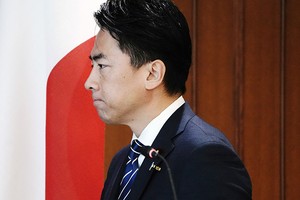By KAZUYA ITO/ Staff Writer
May 4, 2021 at 15:03 JST
 The Tokyo location of the Justice Ministry and the Immigration Services Agency (Asahi Shimbun file photo)
The Tokyo location of the Justice Ministry and the Immigration Services Agency (Asahi Shimbun file photo)
Immigration authorities are revamping guidelines on certifying refugee status to counter overseas criticism of the narrow and ill-defined manner in which applications in Japan are currently handled.
The updated standards, which likely will be in place by summer, will put more focus on gender in determining if an applicant faces persecution in his or her native land, according to sources.
The Immigration Services Agency is also considering covering non-state players, such as the Islamic State militant group, as instigators of persecution.
Sources said the guidelines will be made available to the public to help potential applicants gather the information they need to bolster their case for refugee status.
Japan has long been criticized for the low number of refugees it lets in. Over the five years until 2020, between 4,000 and 20,000 applications were submitted annually, but some years not even 50 gained approval.
Agency officials consulted with the office of the U.N. High Commissioner for Refugees and referred to examples of refugee approvals in other nations in putting together the guidelines, sources said.
The 1951 Convention Relating to the Status of Refugees cites race and religion as factors for possible persecution.
The guidelines will lay out specific details of what will be considered for each factor in assessing refugee applications, as well as the probability the applicant might face persecution if he or she is refused permission to live in Japan.
A new category for persecution to be included will be gender as well as a person's sexual orientation and identity, sources said.
The inclusion of militant groups and other forces as possible instigators of persecution may be a more problematic issue, however.
Agency officials would first have to determine if the state had the power to protect its people from the likes of the Islamic State, antigovernment forces, local armed militias and organized crime.




















A peek through the music industry’s curtain at the producers who harnessed social media to help their idols go global.
A series based on diplomatic documents declassified by Japan’s Foreign Ministry
Here is a collection of first-hand accounts by “hibakusha” atomic bomb survivors.
Cooking experts, chefs and others involved in the field of food introduce their special recipes intertwined with their paths in life.
A series about Japanese-Americans and their memories of World War II